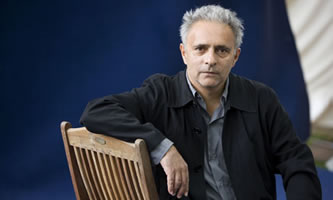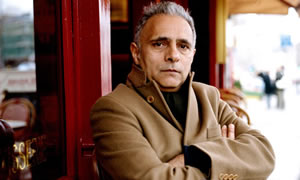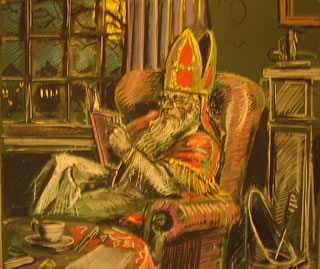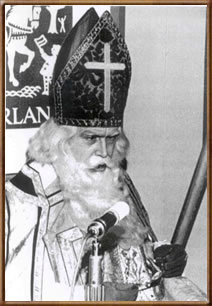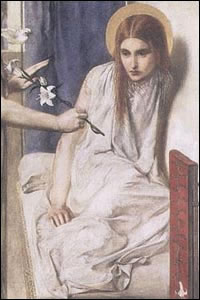De Engelse dichteres en schrijfster Christina Georgina Rossetti werd geboren in Londen op 5 december 1830. Zie ook alle tags voor Christina Rossetti op dit blog.
SYMBOLS
I WATCHED a rosebud very long
Brought on by dew and sun and shower,
Waiting to see the perfect flower:
Then, when I thought it should be strong,
It opened at the matin hour
And fell at evensong.
I watched a nest from day to day,
A green nest full of pleasant shade,
Wherein three speckled eggs were laid:
But when they should have hatched in May,
The two old birds had grown afraid
Or tired, and flew away.
Then in my wrath I broke the bough
That I had tended so with care,
Hoping its scent should fill the air;
I crushed the eggs, not heeding how
Their ancient promise had been fair:
I would have vengeance now.
But the dead branch spoke from the sod,
And the eggs answered me again:
Because we failed dost thou complain?
Is thy wrath just? And what if God,
Who waiteth for thy fruits in vain,
Should also take the rod?
DE PROFUNDIS
OH why is heaven built so far,
Oh why is earth set so remote?
I cannot reach the nearest star
That hangs afloat.
I would not care to reach the moon,
One round monotonous of change;
Yet even she repeats her tune
Beyond my range.
I never watch the scatter’d fire
Of stars, or sun’s far-trailing train,
But all my heart is one desire,
And all in vain:
For I am bound with fleshly bands,
Joy, beauty, lie beyond my scope;
I strain my heart, I stretch my hands,
And catch at hope.
Christina Rossetti (5 december 1830 – 27 december 1894)
De Russische dichter Fjodor Tjoettsjev werd geboren op 5 december 1803 in Ovstug in het gouvernement Orjol. Zie ook alle tags voor Fjodor Tjoettsjev op dit blog.
Vandaag vriend
Vandaag vriend, is het vijftien jaar geleden
sinds die gezegende, fatale dag
waarop zij mij haar hartstocht heeft beleden
en heel haar wezen voor mij openlag.
En al een jaar, zonder verwijt of klagen,
draag ik mijn lot, al nam het alles af:
eenzaam tot aan het einde mijner dagen,
zo eenzaam als ik zijn zal in het graf.
Vertaald door Jean Pierre Rawie

Fjodor Tjoettsjev (5 december 1803 – 27 juli 1873)
De Russische dichter Afanasy Afanasievich Fet werd geboren op 5 december 1820 nabij Mzensk. Hij studeerde in Moskou en diende een tijd in het Russische leger. In 1850 bracht een jonge vrouw die verliefd op hem was, maar met wie om financiele redenen niet kon trouwen zichzelf om het leven door zich te verbranden. In talrijke gedichten bleef Fet op deze gebeurtenis terugkomen. Fets Duitse moeder was twee keer getrouwd en het is nooit echt duidelijk geworden wie van de twee mannen zijn vader was. Pas vanaf 1876 mocht hij de naam van haar tweede, Russische, man, aannemen. Fet was een van de belangrijkste Russische dichters van het laatste kwart van de 19e eeuw.
I Have Come To You Delighted
I have come to you, delighted,
To tell you that sun has risen,
That its light has warmly started
To fulfil on leaves its dancing;
To tell you that wood’s awaken
In its every branch and leafage,
And with every bird is shaken,
Thirsty of the springy image;
To tell you that I’ve come now,
As before, with former passion,
That my soul again is bound
To serve you and your elation;
That the charming breath of gladness
Came to me from all-all places,
I don’t know what I’ll sing, else,
But my song’s coming to readiness.
With One Firm Thrust
With one firm thrust to force the boat of living
From off the sands, and, by a wave tossed high,
Be toward a new life borne, a new beginning,
To feel the wind from scented shores sweep nigh,
To wake from torpid sleep a mind turned sluggish,
To revel in the strange and the unknown,
To lend fresh breath to life, and joy to anguish,
To make another’s cares and griefs your own,
To speak of things it numbs the tongue to utter,
To fire the timid heart that fierce ’tmay pound –
This can the chosen songsmith do, no other,
And ’tis for this that he is known and crowned!
Afanasy Fet (5 december 1820 – 3 december 1892)
Portret door Ilya Repin
De Oostenrijkse schrijver en taalkundige Alois Brandstetter werd op 5 december 1938 in Aichmühl bei Pichl, Oberösterreich geboren. Zie ook alle tags voor Alois Brandstetter op dit blog.
Uit: Der geborene Gärtner
“Du hättest besser, mein Wernher, unserer großen Wohltäter gedenken sollen, als Dich in die Gefahr zu begeben, der Komplizenschaft mit den Feinden in der Heiligen Kirche bezichtigt zu werden und zwielichtige und mißverständliche Äußerungen zu machen. Du kennst mich als einen Mann des Ausgleichs und der Mäßigung, der harte und überharte Worte scheut und auch allen Manichäismus der Schwarzweißmalerei verabscheut. Aber nicht einmal ich kann jenen Herren im Konvent aus voller Überzeugung widersprechen, die Dich mit dem häßlichen alten bairischen Wort “Nestbeschmutzer” bedenken! Während also Du offenbar nach Deinem Selbstverständnis Dich für einen hältst, der “ausmistet” und den Augiasstall von Auswurf befreit, nennen Dich Deine Confratres “Nestbeschmutzer”! Du gereichtest, sagen sie, Ranshofen nicht zur Zier, wenn Dich auch einige sogenannte Intellektuelle im Literaturfach als kritischen Geist und Mann der Distinktion und der Diskretion, das heißt der Unterscheidung der Geister, rühmen und Dir so ein Charisma, eine Gabe des Heiligen Geistes, nachsagen und zusprechen. Für die anderen bist du ein Nestbeschmutzer, der sich der Illoyalität schuldig gemacht, weil er die Kirche der Raffgier bezichtigt, indem er die Partei der Bauern ergreift. Weil ich nun dem Ausgleich das Wort rede und sicher auch, weil ich selbst als Bauernfreund dem Bauerntum nahe stehe, gebe ich, wenn solche Vorwürfe vor allem während Deiner langen Abwesenheit infolge der “Lesereisen” laut werden, immer zu bedenken, daß Du als Bauernbürtiger doch wohl entschuldigt bist, oder wenn nicht ganz enschuldigt bist, so doch ein wenig Nachsicht verdienst, wenn Du Deinem Herkunftsstand ein gutes Andenken bewahrst und ihm Dein Wort leihst.:”

Alois Brandstetter (Aichmühl , 5 december 1938)
De Amerikaanse schrijfster Joan Didion werd geboren in Sacramento Valley op 5 december 1934. Zie ook alle tags voor Joan Didion op dit blog.
Uit: Slouching towards Bethlehem
“Just to watch the front-page news out of Los Angeles during a Santa Ana is to get very close to what it is about the place. The longest single Santa Ana period in recent years was in 1957, and it lasted not the usual three or four days but fourteen days, from November 21 until December 4. On the first day 25,000 acres of the San Gabriel Mountains were burning, with gusts reaching 100 miles an hour. In town, the wind reached Force 12, or hurricane force, on the Beaufort Scale; oil derricks were toppled and people ordered off the downtown streets to avoid injury from flying objects. On November 22 the fire in the San Gabriels was out of control. On November 24 six people were killed in automobile accidents, and by the end of the week the Los Angeles Times was keeping a box score of traffic deaths. On November 26 a prominent Pasadena attorney, depressed about money, shot and killed his wife, their two sons and himself. On November 27 a South Gate divorcée, twenty-two, was murdered and thrown from a moving car. On November 30 the San Gabriel fire was still out of control, and the wind in town was blowing eighty miles an hour. On the first day of December four people died violently, and on the third the wind began to break.
It is hard for people who have not lived in Los Angeles to realize how radically the Santa Ana figures in the local imagination. The city burning is Los Angeles’s deepest image of itself. Nathaniel West perceived that, in The Day of the Locust, and at the time of the 1965 Watts riots what struck the imagination most indelibly were the fires. For days one could drive the Harbor Freeway and see the city on fire, just as we had always known it would be in the end. Los Angeles weather is the weather of catastrophe, of apocalypse, and, just as the reliably long and bitter winters of New England determine the way life is lived there, so the violence and the unpredictability of the Santa Ana affect the entire quality of life in Los Angeles, accentuate its impermanence, its unreliability. The winds shows us how close to the edge we are.”
Joan Didion (Sacramento Valley, 5 december 1934)
De Britse schrijver en regisseur Hanif Kureishi werd geboren op 5 december 1954 in Bromley, Kent, als zoon van een Pakistaanse vader en een Engelse moeder. In 1981 won hij met zijn stuk „Outskirts“ de George Devine Award, een jaar later werd hij door het “Royal Court Theatre“ tot stadschrijver benoemd. In 1990 verscheen zijn eerste roman „The Buddha of Suburbia“. Hij kreeg er de Whitbread Prize for Best First Novel voor. Er volgden drie films: „My Beautiful Laundrette“,„Sammy and Rosie Get Laid“ en “London Kills Me“. „My Beautiful Laundrette“ leverde een Oscarnominatie op.
Uit: Something to Tell You
“Secrets are my currency: I deal in them for a living. The secrets of desire, of what people really want, and of what they fear the most. The secrets of why love is difficult, sex complicated, living painful and death so close and yet placed far away. Why are pleasure and punishment closely related? How do our bodies speak? Why do we make ourselves ill? Why do you want to fail? Why is pleasure hard to bear?
A woman has just left my consulting room. Another will arrive in twenty minutes. I adjust the cushions on the analytic couch and relax in my armchair in a different silence, sipping tea, considering images, sentences and words from our conversation, as well as the joins and breaks between them.
As I do often these days, I begin to think over my work, the problems I struggle with, and how this came to be my livelihood, my vocation, my enjoyment. It is even more puzzling to me to think that my work began with a murder — today is the anniversary, but how do you mark such a thing? — followed by my first love, Ajita, going away forever.
I am a psychoanalyst. In other words, a reader of minds and signs. Sometimes I am called shrinkster, healer, detective, opener of doors, dirt digger or plain charlatan or fraud. Like a car mechanic on his back, I work with the underneath or understory: fantasies, wishes, lies, dreams, nightmares — the world beneath the world, the true words beneath the false. The weirdest intangible stuff I take seriously; I’m into places where language can’t go, or where it stops — the “indescribable” — and early in the morning too.
Giving sorrow other words, I hear of how people’s desire and guilt upsets and terrorises them, the mysteries that burn a hole in the self and distort and even cripple the body, the wounds of experience, reopened for the good of the soul as it is made over.”
Hanif Kureishi (Bromley, 5 december 1954)
De Amerikaanse schrijver, journalist en columnist Calvin (Bud) Marshall Trillin werd geboren op 5 december 1935 in Kansas City, Missouri. Als ‘humorcolumnist’ past Trillin in de Amerikaanse traditie van wijlen Art Buchwald en Dave Barry van de Miami Herald. Veel van zijn columns gaan over eten en reizen. Een deel van zijn journalistieke en fictionele werk is serieuzer van aard.
Uit: About Alice
„I once wrote that tales about writers’ families tend to have a relation to real life that can be expressed in terms of standard network-television fare, on a spectrum that goes from sitcoms to Lifetime movies, and that mine were sitcoms. Now that I think of it, maybe they were more like the Saturday-morning cartoons. Alice played the role of the mom—the voice of reason, the sensible person who kept everything on an even keel despite the antics of her marginally goofy husband. Years ago, at a conference of English teachers where we were both speakers, the professor who did the introductions said something like “Alice and Bud are like Burns and Allen, except she’s George and he’s Gracie.” Yes, of course, the role she played in my stories was based on the role she played in our family—our daughters and I sometimes called her T.M., which stood for The Mother—but she didn’t play it in the broad strokes of a sitcom mom. Also, she was never completely comfortable as the person who takes responsibility for keeping things on an even keel; that person inevitably misses out on some of the fun. (“I feel the need to break out of the role of straight person,” she said in a Nation review of Alice, Let’s Eat that cautioned readers against abandoning long-planned European vacations in order to scour the country for “the perfect roast polecat haunch.”) The sitcom presentation sometimes made her sound stern as well as wise, and she was anything but stern. She had something close to a child’s sense of wonderment. She was the only adult I ever knew who might respond to encountering a deer on a forest path by saying, “Wowsers!”

Calvin Trillin (Kansas City, 5 december 1935)
De Indische dichter Josh Malihabadi werd geboren in Malihabad in Brits India op 5 december 1898. In 1914 studeerde hij af in Cambridge. In 1925 werd hij supervisor voor vertaalwerk aan de univesiteit in Hyderabad, maar hij werd er weggestuurd omdat hij zich in een gedicht tegen de politieke leider van de staat gekeerd had. Hij begon steeds meer te ijveren voor de onafhankelijkheid van India en kreeg uiteindelijk de titel Shaayar-e-Inquilaab (Dichter van de Revolutie).
Beauty And Toil
There she sweats on the road, a beauteous, restless lass,
In scorching sun she breaks the stones, her bangles clink and clash.
what pain is it so strangely mingling with the music,
At each stroke drops of tears trickle down her eyes.
Dust-splattered are her cheeks, her locks embroiled in dust,
Her deep depressed eyes a tender grace reflect.
The blood-red sun sucks her blood without a touch of ruth,
Each heavey hammer stroke tells upon her budding youth.
In the sun her fragrant locks are flying about adrift,
Her limber self is getting wrecked amid the stones and bricks.
Ruddy rays of the sun are drinking undefied,
nectar of narcissus’ eyes, the wine of frangipani cheeks.
Clouds of sorrow heavily hang o’er her tender heart,
Are these her cheeks, or roses two which are fading fast?
Through her tatters can be glimpsed her youthful shape, sorrow-gripped,
Like the moon that wanders through bits of drifting clouds.
Josh Malihabadi (5 december 1898 – 22 februari 1982)
De Duitse schrijver Hans Hellmut Kirst werd geboren op 5 december 1914 te Osterode (voorm. Ost Preussen, nu Polen). Kirst verhuisde als kind veelvuldig daar vader Kirst politieambtenaar was en veelvuldig van standplaats moest wisselen. Hij bezocht o.a. het Kaiser-Wilhelm-Gymnasium in zijn geboorteplaats waarna hij de handlsschool bezocht. Op aanraden van zijn vader nam hij in 1933 dienst in deReichsweht in Köningsberg. In 1941 viel hij met de Wehrmacht Rusland binnen. In 1943 werd hij bevorderd tot luitenant. Van 1943 tot 1945 onderwees hij krijgsgeschiedenis in Schonau (Beieren) en werd uiteindelijk kapitein en leider van de stadsbatterij. In 1946 moest hij voor een commissie verschijnen die hem moest denazificeren. Deze legde hem een publicatie verbod van 2 jaar op. Zijn grote voorbeeld was Erich Maria Remarque en in 1950 kwam zijn eerste boek uit; “Wir nannten ihn Galgenstrick“. Dit werd in 1954 gevolgd door zijn beroemde 08/15, een satirisch geschreven verhaal over enkele Duitse soldaten gedurende de oorlog In 1962 had hij enorm succes in de USA met “De nacht der generaals”. Kirst won verschillende literatuurprijzen.
Uit: 08/15
„Ich übernehme hier das Kommando“, sagte der fremde Oberst, der Hauk hieß oder der sich doch zumindest als „Oberst Hauk“ vorgestellt hatte. Und er hatte das mit der unnachgiebigen Höflichkeit eines überzeugten Vorgesetzten getan.
Der Oberst Hauk betrachtete die Offiziere, die sich in dem Birkenwäldchen um ihn versammelt hatten. Sein flächiges, graubleiches Gesicht blieb regungslos. Müdigkeit lag in seinen Augen; doch sie entbehrten nicht einer gewissen Vornehmheit.
„Bin ich verstanden worden?“ fragte der Oberst, und seine Stimme klang sanft fordernd. …..
Hans Helmut Kirst (5 december 1914 – 23 februari 1989)
De Duitse schrijfster Eugenie Marlitt werd geboren op 5 december 1825 in Arnstadt. Zie ook mijn blog van 5 december 2006.
Uit: Die zwölf Apostel
“Am äußersten Ende einer kleinen mitteldeutschen Stadt, da, wo die letzten Gäßchen steil den Berg hinaufklettern, lag das große Nonnenkloster. Es war ein unheimliches Gebäude mit seinen eingesunkenen Fenstern, seinen kreischenden Wetterfahnen und den unaufhörlich um den First kreisenden Dohlenschwärmen. Aus dem Mauergefüge quollen dicke Grasbüschel, und zwischen den zerbröckelten Steinzieraten über dem gewölbten Torweg nickte ein kleiner Wald von Baumschößlingen. Wie zwei altersschwache Kameraden, deren einer den andern stützt, lehnten sich der Bau und ein uraltes Stück Stadtmauer aneinander, und das war vorteilhaft für das Kloster, denn
die Mauer war sehr dick; man hatte ihren breiten Rücken mit Erde belas
tet, und nun sproßte und blühte es da droben so üppig, als gäbe es keine Mauersteine unter der Erdschicht. Freilich war das Ganze nur ein längliches Blumenbeet, von einem kaum fußbreiten Weg durchschnitten; dafür war es aber auch saubergehalten wie ein Schmuckkästchen. An den Wegrändern blühte ein Kranz weißer Federnelken; Lilien und Nachtviolen standen auf dem Beet, und die glühroten Früchte der Erdbeeren, samt ihren breiten, gezackten Blättern, mischten sich mit dem wilden Thymian, der, am Mauerrand hinabkletternd, seine feinen Zweige behutsam in die Steinritzen legte. Hinter der Mauer lag der ehemalige Klostergarten, jetzt ein wüster ungepflegter Grasfleck, auf dem die wenigen Ziegen der Klosterbewohner ihr karges Futter suchen durften. Aber an der Mauer selbst stand eine ganze Wildnis von Syringen und Haselstauden; die bildeten droben am Gärtchen eine grüne undurchdringliche Wand. Die Syringen hingen im Frühjahr ihre blauen und weisen Blütentrauben über das einzige hölzerne Bänkchen des kleinen Gartens, und ein alter Kastanienbaum breitete seine Äste weit über die Mauer bis in die Straße hinein, deren armselige Häuserreihe hier mündete und von dem letzten Haus nur die Rückwand ohne Fenster sehen ließ.”

Eugenie Marlitt (5 december 1825 – 22 juni 1887)
